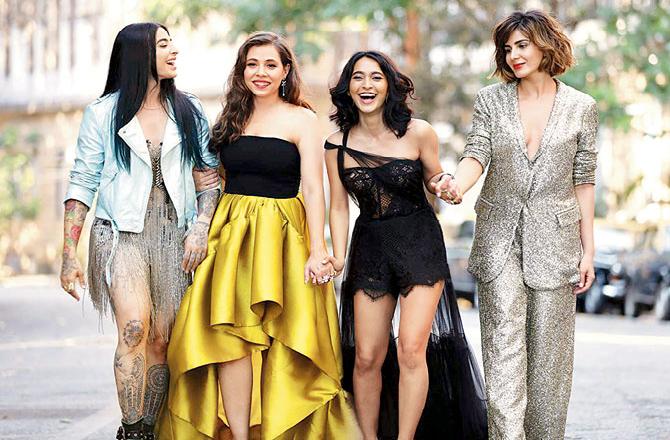The Indian Sex and the City. The series form of Veere di Wedding. These are possibly the titles that Amazon Prime’s new series Four More Shots Please was hoping to achieve. The show is based in Mumbai. But it is hard to remember that because it is over-westernised to mimic Sex and The City. With four very different females in the lead roles, the show tries to provide a glimpse into the life of a modern, urban, upper class, upper caste, privileged woman in India. This glimpse is so narrow, that they cannot even get these characters right.
Anjana, Damini, Siddhi and Umang are all living in SoBo (South Bombay), which should be called SoMu (South Mumbai) according to Umang, who hails from Ludhiana. These women are shown to be fighting biases about gender and sexuality, even as the makers of the show do little to hide the show’s own stereotypes. The chubby girl is the virgin. The bisexual is the overtly sexual one who’s constantly hooking up with someone. The divorced mother is the one who’s never explored masturbation. And the career-minded startup owner is the obsessive-compulsive loner.
Women with this level of privilege, still face gender-based issues in India. From workplace discrimination and online harassment to safety on the streets, the show had great potential to portray a realistic version. Nevertheless, these characters are shown as one-dimensional caricatures of themselves. The show seems more like Sex and the City with Indian characters, rather than an Indianised version of the same.
These women are shown to be fighting biases about gender and sexuality, even as the makers of the show do little to hide the show’s own stereotypes.
For a significant duration, there is no depth whatsoever to these women’s characters. This changes after the fourth or fifth episode, when it seems like the makers are done trying to enforce their stereotypes and actually let the women breathe. This is not to say that the show doesn’t have its moments. Anjana’s struggles with addressing her sexual needs whilst being a mother, Siddhi’s body image issues, and Damini’s inability to gain control over her professional life whilst struggling to understand her romantic feelings, are all relatable problems. Perhaps the most relatable one is Umang hiding her relationship from her closest friends, while struggling with the fact that her girlfriend doesn’t openly accept her.
Four More Shots Please redeems itself from being a wasted opportunity in the last 4 episodes, when it grows organically, and frees the women from fulfilling their specific clichés.
You find yourself rooting for Umang when she falls in love with a woman, and feel her pain when her girlfriend is not ready to come out of the closet. Umang, who has run away from her traditional family to brazenly live her sexuality, cannot bear the suffocation of being in the closet again. On the other hand, her girlfriend’s need to hide her sexuality on account of being a public figure is also understandable. Umang’s former girlfriend, who didn’t have the courage to be open about her sexuality, is shown to be struggling with her marriage and family life. The show must be lauded for this varied portrayal of queer women from different backgrounds, with vastly different personalities.
It goes on to show that women are capable of understanding and supporting one another, no matter how different they are.
You find Damini’s agony on losing control over her career relatable. Damini’s highly moralistic and ethical approach to her journalism costs her her position in the startup she founded. Her struggle to deal with her OCD and mental health problems is dealt with sensitively. Even though her love life consists of dalliances with multiple men, the show never uses any slut-shaming language, nor does it celebrate her promiscuity.
Also read: Here Are 5 Women-Centred Movies That Are Not Necessarily Feminist
Anjana’s bonding moment with her ex-husband’s girlfriend Kavya is refreshing, even though the two only talk about what a man-child their former and current lover is. Anjana starts dating a younger man, who is an intern at her office. It is refreshing to see a mother being able to enjoy and explore her own sexual life, while having a meaningful career. He is also shown to be assertive about his requirements from the relationship, and does not shy away from speaking his mind. In spite of doing everything in her power to protect her daughter, Anjana faces the risk of losing access to her daughter for being an ‘unfit mother’.
Also read: Here Are 5 Women-Centred Movies That Are Not Necessarily Feminist
Siddhi’s desire to feel good about her body, whilst becoming progressively in control of her own life, is great development of character. She loses her virginity in an underwhelming way, starts understanding herself, and takes charge of her sexuality and romantic life all within the first season. When it is revealed that she has been putting up erotic videos of herself online, she does have to face victim-blaming, but she is unapologetic about her actions.
In a surprising turn of events, the only person who supports her is her mother. This is the same woman who criticises Siddhi constantly, and is one of the major reasons behind her body images issues. It goes on to show that women are capable of understanding and supporting one another, no matter how different they are. An almost villainous mother is also capable of being empathetic to her daughter’s needs.
Through Damini and Siddhi’s characters, the show superficially explores the pervasive issue of online harassment and bullying of women. One can only hope that this issue will be dealt in greater detail in the next season.
Female-centric entertainment has come a long way. While these shows are compared to movies like Pyaar ka Punchnama and Sonu ke Titu ki Sweety, their similarity is limited to the fact that they are about hetero friendships. The above mentioned films about male friendships invariably treat the female characters with disdain and dismissal.
Also read: Why No Chuddy Buddies For Women In Bollywood?
It is important to note that Four More Shots Please (and even Veere di Wedding) treat its male characters with nothing but respect. And while Four More Shots Please does have some good qualities, it fails to give its characters the depth that they deserve. Perhaps the show’s biggest flaw is its failure to bring out the most basic problems of its target audience: urban Indian women.
Featured Image Source: Mid-Day
About the author(s)
Tanika Godbole is a writer/journalist based in Mumbai. She is interested in LGBT and women's rights, and is keen on writing about those topics. She also makes terribly drawn comics on human rights and pop culture. They can be found on https://www.facebook.com/godbolet/





Hi..I finished this series yesterday, and yes I was confused what is being liberal , as if we turn around the tables for the same like “CHAAR PEGG PATYALA” story of four liberal MALE FRIENDS , I’m sure the allegation trap would ‘ve caged the male dynasty and the story script narration point would’ve been different meaning for the audience. AND ONE THING WHY ALL PUNJABI’S AND FAMILIES ARE SHOWN AS UNEDUCATED IN MODERN SOCIETY OR FROM HIGH SOCIETY PERCEPTIVE..like “TUTOO”–FOR TATOO, “LESBON KI HUNDA HAI????” COMMON–!! GIMME A BREAK!!!
THE CONECPT COULD HAVE BEEN DIFFERENT BUT JUST AS ONE OF THE CHARACTERS SAYS ..”INDIA MEIN GAADI BHI BIKNI CLAD WOMAN K BINA NAHI BIKTI” , the Team followed the same logic and try to serve the story with lust and objectifying the WOMEN.
I SHOULD SAY THE SERIES COULD HAVE BEEN MADE WITH IMMACULATE CONCEPTION with required PINCH of SENSUALITY.